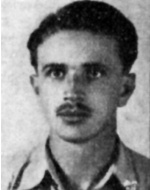Cindar, Reuven-Haim
The son of Gusta and Arieh was born on August 20, 1923. At the age of two, the father and the family returned to Poland, the country of origin, and in 1939 Reuven completed the “Tarbut” Hebrew Gymnasium in Pinsk And in 1941, a high school in Lvov, where he excelled in his studies and especially in mathematics, and when he came to Lvov he fled with his father to Russia and wandered a lot, but his desire for studies did not dispel him: his documents were lost and in Stalingrad he was examined for a second matriculation certificate. Work to help his sick father, but his father died of starvation He was in prison When the Polish Liberation Army of Vanda Vasilewska Raise him and served him until the fall of the Berlin two years. So UNRWA received the University of Munich and again tested Examination maturity. ReuSon of-Chaim was soaked with love for the land, a love he had acquired at his parents’ house and which had intensified with the death of his father. He sought ways to immigrate, made contact with Beit Alpha, and on 19.8.1946 came to Israel. For a while he sat at Beit Alfa, but he wanted to study at the university. At the beginning of the year 5707 he was admitted to the Hebrew University of Jerusalem and studied mathematics at the Faculty of Natural Sciences, took part in the first year classes, was the first in the entire class and attracted the attention of all his teachers. The UN General Assembly on November 29, 1947, on the partition of the country, enlisted and escorted buses to Mount Scopus and the school neighborhoods. He excelled in the gun and was credited with many actions against the enemy. He soon became known to the British and Arab police and had to be transferred to other places. To the place where he was, no Arab dared approach. On a sniper day and at night he went on patrols in Arab villages with some of his men. At the end of the tour, he threw a grenade in a house that served as a rioters’ nest. He ran around wet to his bones and refused to get a coat. “I’m used to a winter war in Russia,” he told his subordinates, “and you may catch a cold.” When he saw that one of his men, a father of young children, went out on his way to night activities and tours, they prevented him from saying, “I have no relative and redeemer. No one will cry if I fall and no one remembers me.” At the same time, he strove to find himself a quiet corner after his wanderings. When he recovered from a serious wound, he returned to positions and fell from a sniper bullet when he repulsed an attack on the source of life in Jerusalem on March 20, 1948. He was buried in Sanhedria in Jerusalem and was promoted to lieutenant Professor Frenkel, who eulogized Reuven, “A young man unusual in character, talents, and history. Immigrated to Israel after legendary adventures in almost Poland, Russia, Austria and Germany. In four countries, final exams in different languages are examined and his diplomas have always been lost. The kibbutz invented a Palestinian passport for him, and his life’s dream was realized. The extent of his success attests to the fact that, after only one year of study, I could have offered him the prize for the Bialik Prize as a top candidate in the mathematics department. He also had a temperamental temperament in science and in his private ways … At the outbreak of the battle, he volunteered to serve in the first row and was soon assigned important and dangerous positions. I did have the impression that he felt a risk not of lack of respect for life but of contempt for danger. This trait must have liked him even more for his friends and friends, but he was probably in his way … The memory of this excellent young man will not be removed from his friends and teachers. “On the 20th of Cheshvan 5711 (November 20, 1951) he was put to rest in the cemetery at home Alpha.
